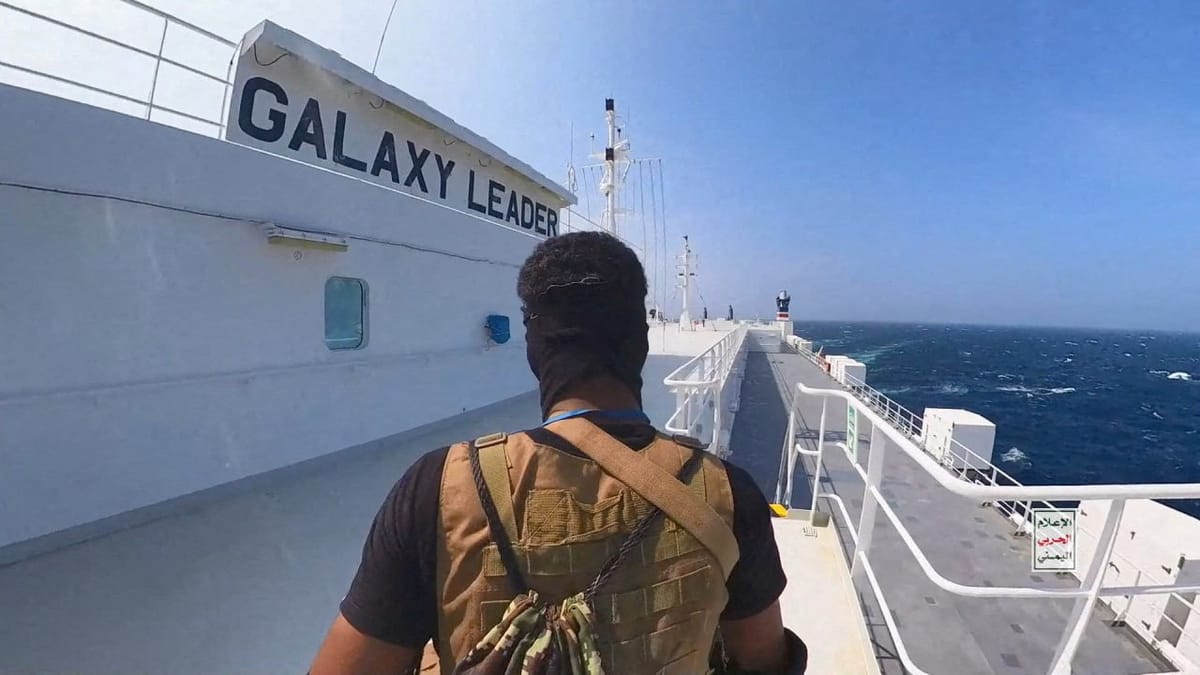How the Red Sea attacks affect Asia’s supply chain
We’re approaching the peak of the holiday season, and a supply chain crisis could be in the air.

A few minutes every morning is all you need.
Stay up to date on the world's Headlines and Human Stories. It's fun, it's factual, it's fluff-free.
The backstory: The Yemen-based Houthi militant group is backed by Iran, and it has control over most of the northern part of Yemen. The Houthis are big supporters of Palestine in the ongoing conflict between Israel and Hamas. Over the past few weeks, Houthi militants have been attacking commercial ships in the Red Sea – especially those linked to the West or Israel. The Red Sea is accessible via the Suez Canal, the shortest shipping route between Europe and Asia. They mostly use attack drones and missiles to try to damage these ships, which are typically oil tankers and container ships. In fact, most of the world’s oil is shipped through these waters. Over a dozen ships have been attacked since the conflict between Israel and Hamas began.
More recently: The attacks have become such a major threat that some shipping giants and oil companies are changing routes so they don’t have to go through the Suez Canal. MSC, Maersk, Hapag Lloyd, CMA CGM, Yang Ming Marine Transport and Evergreen all announced plans to redirect routes. And, Evergreen is also suspending services bound for Israel. Orient Overseas Container Line (OOCL) isn’t accepting Israeli cargo, either. Many ships bound for Asia are going all the way around Africa to reach their destinations. Because of these disruptions, there could be issues getting goods on time and price hikes on certain things. Earlier this week, US Defense Secretary Lloyd Austin announced an American-led international force to safeguard ships as they move through the Red Sea.
The development: We’re approaching the peak of the holiday season, and a supply chain crisis could be in the air. It’s estimated that ships going all the way around the Cape of Good Hope in Africa are adding up to two weeks’ time to their shipping routes. That’s 30-40% more time than it usually takes them to get from Europe to Asia. On top of that, fewer ships have been operating in the Suez Canal since around July because of a drought in the region that’s lowered the water levels. It’s also expected that there will be delays in returning empty containers to Asia, which throws another wrench in the supply chain. Logistics and shipping companies are already saying the situation is reminiscent of supply chain troubles during the pandemic.
Key comments:
“Avoiding the Red Sea will lead to higher cost due to longer travel time,” ABN Amro analyst Albert Jan Swart told Reuters.
“Approximately 19,000 ships navigate through the Suez Canal annually,” Michael Aldwell, executive vice president of sea logistics at Kuehne+Nagel said. “The extended time spent on the water is anticipated to absorb 20% of the global fleet capacity, leading to potential delays in the availability of shipping resources.”
“Import costs will be higher for perishable food items with limited shelf lives like cheese, butter and salmon as well as beverages like wine,” said Cedomir Nestrovic, professor of geopolitics at Singapore’s ESSEC Business School Asia-Pacific.
"If Gaza does not receive the food and medicine it needs, all ships in the Red Sea bound for Israeli ports, regardless of their nationality, will become a target for our armed forces," a Houthi spokesperson said in a statement earlier in December.




Comments ()